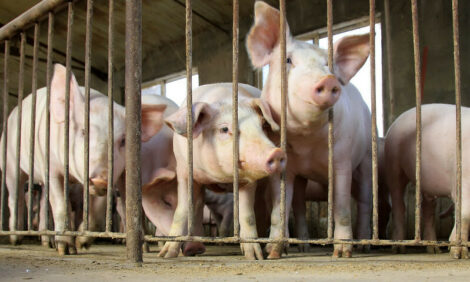



Pig Sector Fighting Feed Costs
ANALYSIS - Pig producers in the UK have been losing money for nearly two years and the losses are getting greater, writes ThePigSite Editor in Chief, Chris Harris.A new report on feed prices from the British Pig Executive shows that the high and rising feed costs mean that the total cost of producing pigs is currently much higher than the price, which the farmer is receiving.
At present farmers are losing about 318 per pig.
The report, "Feed Price Rises Put Pressure on Pig Industry", says that the cost of pig production in the UK is nearly 173p per kg. Of this amount, feed makes up 60 per cent at 109p per kg. However these figures do not take into account recent rises in feed costs or rises in feed costs that are expected to come.
BPEX believes that the cost of production is going to remain at about 166p per kg until after the harvest.
At present the current prices being paid for pigs is about 150p per kg.
Feed costs have been rising far more quickly than the deadweight average pig prices (DAPP) and the situation has been continuing for 22 months.
To date over this period BPEX estimates that the British pig industry has lost about 3200 million.
However, the situation does not appear to be unique to the UK.
In Europe, because of the weakness of the Euro, feed prices could be even higher, particularly as commodity prices are quoted in US dollars.
And in the US, the latest reports from the USDA and economic forecasters, show corn and soybean futures rising and expectations on this year's harvest for corn being revised down - from 166 bushels an acre to 150 bushels an acre because of the severe drought.
This too is expected to have a knock on effect to feed prices in Europe and the UK.
In Europe, the high and rising feed prices are also coming at a time when mush of the EU outside of the UK is investing in new housing for pigs to comply with the ban on sow stalls that is to come into force at the end of the year.
While the US crops have been hit by drought, the concerns in the UK are over when the harvest might be possible because of the heavy rains.
In recent weeks the price of feed wheat, the most important component of pig fed for UK farmers, has risen by nearly 330 a tonne.
"At the start of June, UK LIFFE feed wheat futures for July delivery stood at 3171 per tonne. By 15 June, this had risen marginally to 3175 per tonne. Three weeks later, on 6 July, the price had reached 3204.25 per tonne," the BPEX report says.
"At the start of June, LIFFE feed wheat futures for November delivery stood at 3154.75 per tonne as prospects for the 2012 harvest looked promising. This figure changed little during the first half of June but then began to rise sharply. By Friday 6 July, the price had reached 3180.50 per tonne and rose further on Monday 9 July. Futures prices for November 2013 have also risen, albeit less sharply, to over 3160 per tonne."
While the US drought is having an effect on soybean meal prices both in the US and also in Europe, so are the rising prices for soybean meal coming from South America, which has been experiencing similar drought conditions.
As the soy futures rose in the Chicago Board of Trade Building, so the UK prices followed.
The BPEX report shows that Hi-Pro soya meal ex-mill Liverpool reaching 3440 a tonne from a point at the beginning of the year when it was 3300 a tonne. These rising prices have pulled up all the other cereal, seen and grain prices such as sunflower and rape.
BPEX believes that the only way out of the difficulties is for pig prices to rise sharply.
However, this is likely to put further pressure on the processors, who are also experiencing tight margins. Already these tight margins could possibly see the closure of one major pig meat processor n Scotland, Halls of Broxburn, part of the Vion Food Group.
Prices are also likely to be forced up across Europe because of the new welfare regulations coming in and with higher prices all around, the pig meat trade within Europe could be stifled.






